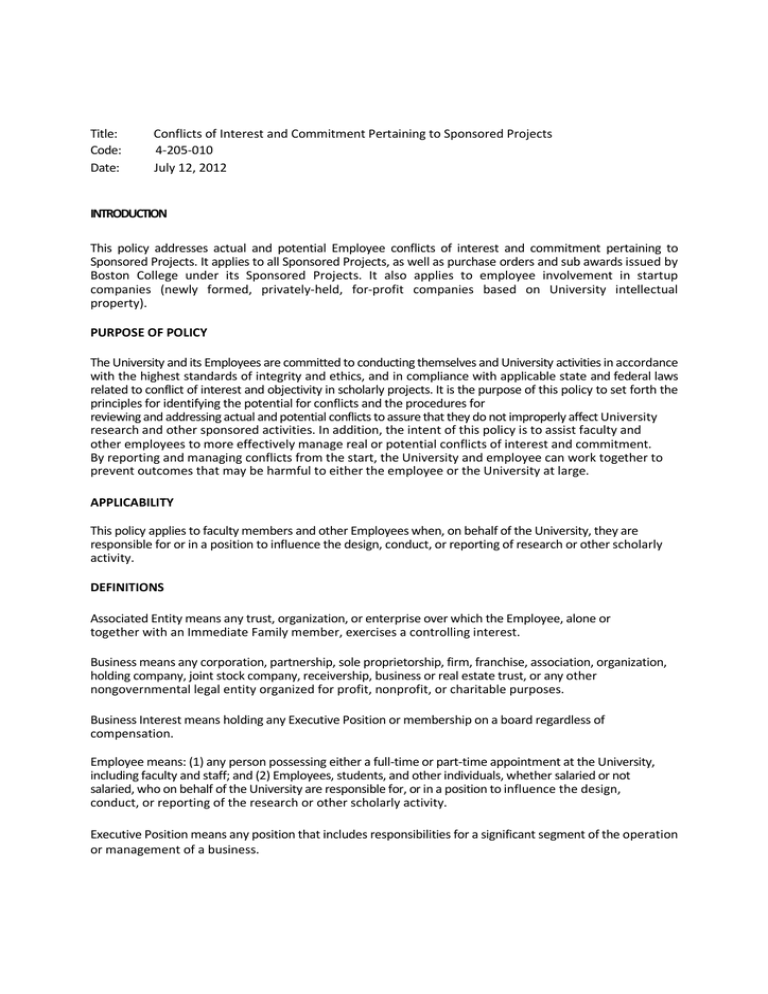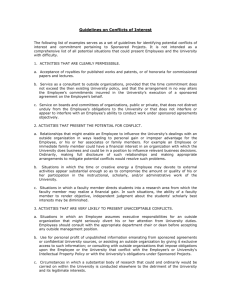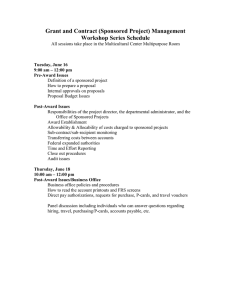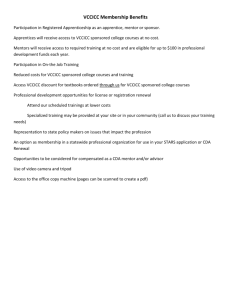Title: Conflicts of Interest and Commitment Pertaining to Sponsored Projects Code: 4-205-010
advertisement

Title: Code: Date: Conflicts of Interest and Commitment Pertaining to Sponsored Projects 4-205-010 July 12, 2012 INTRODUCTION This policy addresses actual and potential Employee conflicts of interest and commitment pertaining to Sponsored Projects. It applies to all Sponsored Projects, as well as purchase orders and sub awards issued by Boston College under its Sponsored Projects. It also applies to employee involvement in startup companies (newly formed, privately-held, for-profit companies based on University intellectual property). PURPOSE OF POLICY The University and its Employees are committed to conducting themselves and University activities in accordance with the highest standards of integrity and ethics, and in compliance with applicable state and federal laws related to conflict of interest and objectivity in scholarly projects. It is the purpose of this policy to set forth the principles for identifying the potential for conflicts and the procedures for reviewing and addressing actual and potential conflicts to assure that they do not improperly affect University research and other sponsored activities. In addition, the intent of this policy is to assist faculty and other employees to more effectively manage real or potential conflicts of interest and commitment. By reporting and managing conflicts from the start, the University and employee can work together to prevent outcomes that may be harmful to either the employee or the University at large. APPLICABILITY This policy applies to faculty members and other Employees when, on behalf of the University, they are responsible for or in a position to influence the design, conduct, or reporting of research or other scholarly activity. DEFINITIONS Associated Entity means any trust, organization, or enterprise over which the Employee, alone or together with an Immediate Family member, exercises a controlling interest. Business means any corporation, partnership, sole proprietorship, firm, franchise, association, organization, holding company, joint stock company, receivership, business or real estate trust, or any other nongovernmental legal entity organized for profit, nonprofit, or charitable purposes. Business Interest means holding any Executive Position or membership on a board regardless of compensation. Employee means: (1) any person possessing either a full-time or part-time appointment at the University, including faculty and staff; and (2) Employees, students, and other individuals, whether salaried or not salaried, who on behalf of the University are responsible for, or in a position to influence the design, conduct, or reporting of the research or other scholarly activity. Executive Position means any position that includes responsibilities for a significant segment of the operation or management of a business. 2 Immediate Family means the Employee’s spouse or domestic partner and dependent children. Significant Financial Interest means a financial interest meeting one or more of the three criteria outlined in the section of this policy captioned “Conflict of Interest.” Sponsored Agreement means a contract, grant, cooperative agreement, or any other document that binds the University to terms and conditions and provides funding or other consideration (e.g., scientific equipment) in lieu of funds to support a Sponsored Project. Sponsored Project. “Sponsored Project” means research, training, and instructional projects involving funds, materials, or other consideration from outside sources under agreements that bind the University and/or an affiliated institution to one or more of the following: 1. A line of scholarly or scientific inquiry specified to a substantial level of detail; 2. A line-item budget; 3. Financial reporting; 4. External audit; 5. The return of unexpended funds to the sponsor at the conclusion of the project; or, 6. The disposition of either tangible or intangible properties that may result from the activity. POLICY The University and its Employees often benefit from Employees’ participation in both public and private outside activities. The University has no interest in unreasonably interfering with Employees' legitimate outside interests. University Employees, in turn, have an obligation to ensure that their outside obligations, financial interests, and activities do not conflict or interfere with their commitment to conduct University research and other sponsored activity without improper influence, and to disclose to the University all actual or potential conflicts of interest. A research university promotes the public good by fostering the transfer of knowledge gained through university research and scholarship to the private sector. A conflict of interest exists in any situation in which a faculty member has an outside interest that might affect, or appear to affect, his or her judgment in carrying out University responsibilities. Professional external activities conducted by a faculty member should improve effectiveness as a teacher or contributor to scholarly attainments, or should in some manner serve the interests of the University or of the University community. External activities must not distract significantly from a faculty member’s primary responsibilities and must not require such extensive absence as to cause the faculty member to neglect course obligations or to become unavailable to students and colleagues. External activities should be of such nature and conducted in such manner that they bring credit to the University, and must not compromise any intellectual property owned by the University. Conflict of Interest In those circumstances in which the University is engaged in or intends to engage in a Sponsored Project, or has subcontracted or intends to subcontract a part of the work under one of the University's Sponsored Projects, a conflict of interest may occur when an Employee, members of the Employee’s Immediate Family, or 3 an Associated Entity has a Business Interest in a Business sponsoring the Sponsored Project or whose purpose or activities are similar or related to the work to be conducted under the Sponsored Project, or when the Employee has a Significant Financial Interest in such Business. A Significant Financial Interest is defined as a financial interest meeting one or more of the following criteria: 1. The Employee, Immediate Family members, or Associated Entity have an aggregated equity interest in the Business representing ownership of 5 percent or more or a value of $10,000 or more, as determined through reference to public prices or other reasonable measures of fair market value; 2. The Employee, Immediate Family members, or Associated Entity are expected to receive aggregated annual income or other consideration from the Business equal to or exceeding $10,000 over the next 12 months (income includes all types of compensation); or 3. The Employee, Immediate Family members, or Associated Entity have a commitment for future royalties from the Business the next 12 months and beyond that are expected to equal or exceed $10,000 in aggregated annual income. Conflict of Commitment It is the policy of the University that all faculty members are expected to devote their primary professional time, and energy to their teaching, research and other scholarly works, service on University committees, assistance for students, performance of necessary administrative duties, and, where applicable, patient care. Although a specific work-week is not defined for faculty members, it is expected that such membership constitutes a full-time obligation and that, with the exceptions explicitly permitted by University policies on external activities, they will not engage in other employment. Accordingly, external activities must be arranged so as not to interfere with the primary commitments. External activities conducted by a faculty member should be of such nature as to improve effectiveness as a teacher or contribute to scholarly attainments, or should in some manner serve the interests of the University or of the community. External activities must not distract significantly from primary responsibilities and must not require such extensive absence as to cause the faculty member to neglect course obligations or to become unavailable to students and colleagues. External activities must be of such nature and conducted in such manner that they not compromise any intellectual property owned by the University. Specific requirements for Employees serving in non-faculty positions can be found in University Policy 1-100-010, Professional Standards and Business Conduct – General Policy. Guidance on external affiliations for faculty members can be found in the University Statutes, which state in part, “Non-teaching professional service outside the University shall not interfere with the fulfillment of faculty responsibilities and shall not exceed the equivalent of one day per week. For any work of a continuing or regular nature, annual approval by the Provost is required.” Employees whose appointments are less than full-time are expected to devote professional time, and energy to their teaching, research, patient care, and/or administrative activities, in accordance with their agreed-upon time commitments. 4 In no event should a faculty member engage his/her students as employees on personal consulting agreements or in connection with other personal business, including performance of duties related to any Business Interest or Significant Financial Interest University resources, including facilities, personnel, equipment, or confidential information, must not be used, except in a purely incidental way, in connection with such personal business, or for any other purposes that are unrelated to the education, research, scholarship, and public service missions of the University. All non-university external affiliations are to be performed strictly as a personal matter using personal or nonuniversity resources. Employees may not provide preferential access to research results, materials or products generated from University teaching or research activities, or to university-owned equipment to an external entity for personal financial gain. Review of Disclosures Each Employee participating in a Sponsored Project who is responsible for or in a position to influence the design, conduct, or reporting of research or other scholarly activity must disclose whether or not he or she has external affiliations that may constitute a conflict. A disclosure must be completed prior to the University's submission of the Sponsored Project proposal or issuance of a purchase order or subcontract for the acquisition of goods and services. The disclosure shall be submitted on the form approved from time to time by the Office for Research Integrity and Compliance, and shall be sent to the Office for Sponsored Programs. Positive disclosures will be reviewed by the Conflict Review Committee, consisting of the Vice Provost for Research; the Director, Office for Sponsored Programs; the Director, Office for Research Integrity and Compliance; and the University General Counsel. Additional members may be added on an ad hoc basis as deemed appropriate by the Vice Provost for Research. If conditions change after the submission of a disclosure, the Employee shall submit a revised disclosure at the time the change(s) are known to the Employee. The Conflict Review Committee will review all positive disclosures in order to assure adherence to relevant University policies as may be outlined from time to time in such relevant documents as The University Statutes, the Policies and Procedures Manual, the Faculty Handbook, the Intellectual Property Policy, the Research and Projects Policy, and other University documents the Conflict Review Committee may deem appropriate. In conducting its review the Conflict Review Committee shall: 1. Consider the nature and extent of the actual or potential conflict of interest or commitment in the relationship of the Employee and the external organization; 2. Give special consideration to the terms and conditions of Sponsored Project agreements that may mitigate or complicate the given situation; 3. Consult with and obtain additional information from the Employee as either the Conflict Review Committee or the Employee feel may be helpful in resolving actual or potential conflicts; and 4. Act in a timely manner so as not to delay unduly the conduct of the Sponsored Project. Following its review the Conflict Review Committee shall notify the Office for Sponsored Programs that one of the following action must occur: 1. Accept the Sponsored Project award and notify the sponsor as may be required by sponsor policy. 2. Decline the Sponsored Project Award. 5 3. Accept the Sponsored Project subject to suitable modifications in either the Sponsored Project Agreement or the Business Interest or Significant Financial Interest of the Employee or Employee’s Immediate Family. This may be accomplished through the development of a written conflict of interest management plan. If the Employee is dissatisfied with the Conflict Review Committee's conclusion, the Employee may appeal to the Provost who will consult with the Employee and the Conflict Review Committee as the Provost deems necessary and appropriate to the particular circumstance. The decision of the Provost shall be final. Violations of this policy, such as willful concealment of Business Interests or Significant Financial Interest or a Conflict of Commitment, or failure to abide by a conflict of interest management plan, may result in sanctions being imposed upon the violating individual. The Conflict Review Committee will review allegations of violations and will make recommendations regarding the imposition of sanctions to the Provost. The decision of the Provost with regard to the imposition of sanctions shall be final. The Office for Sponsored Programs shall maintain the records pertaining to each disclosure in strict confidence. Access to such records will be limited to the Employee, the Conflict Review Committee, the Provost, and others who have a legal right to review the records. Certain sponsors, particularly federal agencies, may have requirements that differ from this policy particularly with regard to the timing and frequency of faculty disclosures. In the case of any discrepancies, the sponsor’s requirements will generally prevail. Reporting Requirements to Sponsoring Agencies Prior to the expenditure of sponsored research funds, the Office for Sponsored Programs, to the extent required by the sponsor, will notify it of the existence of any potential conflict of interest and provide assurance that the conflict has been managed or eliminated. SITUATIONS NOT NECESSARILY INVOLVING SPONSORED PROJECTS Disclosure Pertaining to Technology Transfer An Employee involved with transferring technology through patents or licensing to a Business in which the Employee has (1) a Business Interest or Significant Financial Interest or (2) holds a position on the Business’ scientific board of advisors or similar body must disclose the Business or Significant Financial Interest to the Director, Office for Research Integrity and Compliance. This disclosure must be made prior to the negotiation of a license or any other business arrangement by the Office of Technology Transfer and Licensing with the Business. If, after the license or other business arrangement is executed, the Employee is offered either (1) a Business Interest or a Significant Financial Interest in the Business or (2) a position on the Business’ scientific board of advisors or similar body, this offer must be reported to the Director, Office for Research Integrity and Compliance. This disclosure must be made prior to the Employee’s oral or written acceptance of such an offer from the Business. Disclosure for Projects Involving Human Participants1 When an Employee submits a disclosure pertaining to a Sponsored Project that indicates that human participants are involved in the research and a Significant Financial Interest or a Business Interest is also disclosed, the Conflict of Interest Committee will report the positive disclosure to the Office for Research Protections which shall report the disclosure to the Boston College Institutional Review Board (BCIRB). 6 Immediately after the Conflict of Interest Committee has resolved the disclosed conflict, it will report the final resolution to the Office for Research Protections which shall report the resolution to the BCIRB. The BCIRB may specify special conditions to the informed consent process or other aspects of the conduct of the project as it deems necessary to protect the welfare of the human participants involved in the research. The BCIRB is not authorized to impose additional requirements on the project’s principal investigator concerning the management of the conflict of interest. In the event a Significant Financial Interest is disclosed in the Protocol Application, the Office for Research Protections will immediately report this to the Conflict of Interest Committee. Immediately after the Conflict of Interest Committee has resolved the disclosed conflict, it will report the final resolution to the Office for Research protections which shall report such resolution to the BCIRB. The BCIRB may specify special conditions to the informed consent process or other aspects of the conduct of the project as it deems necessary to protect the welfare of the human participants involved in the research. The BCIRB is not authorized to impose additional requirements on the project’s principal investigator concerning the management of the conflict of interest.



